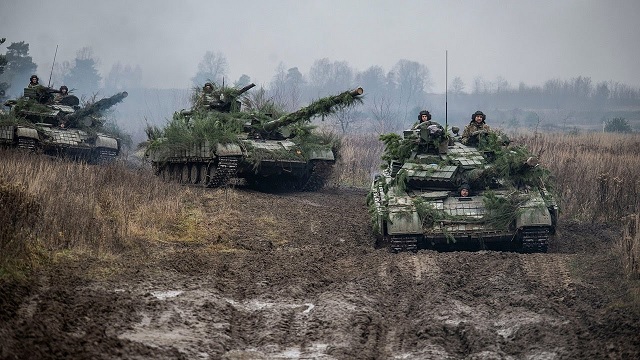
Beijing, China | Xinhua | The year of 2022 saw a world in turmoil: the United States fueled one conflict after another, the Ukraine crisis dragged on, the COVID-19 pandemic lingered on with Omicron emerging as the new strain.
Inflation, food crisis, energy security, a sluggish world economic recovery, a worrisome climate and stalled climate negotiations … These overlapping challenges have tested humanity beyond measure.
Looking ahead to 2023, solutions remain in sight to these seemingly intractable problems so long as countries jointly deliver real, concrete actions.
THE UKRAINE CRISIS
The crisis in Ukraine escalated on Feb. 24, 2022, when Russia launched a special military operation against Ukraine. Since then, the U.S.-led West has continued to provide military and economic aid to Ukraine, turning the conflict into a protracted one. The United States and its allies have also imposed tough sanctions on Russia on an unprecedented scale, but have failed to crush the Russian economy.
At present, the Russian and Ukrainian forces are basically caught in a stalemate. Due to huge divisions between the two sides, it is difficult to resolve the crisis through negotiations in the short term.
The United States continued to fan the flame by announcing an additional 1.85 billion U.S. dollars in military aid to Ukraine, including the Patriot air defense system. The U.S. Congress also passed recently the omnibus bill for 2023, which includes up to 45 billion dollars in emergency funding for Ukraine. Meanwhile, Russia lately signaled a military buildup by announcing plans to beef up its armed forces to 1.5 million from 1.15 million.
It remains unpredictable whether the crisis will come to an end or escalate further in 2023, the evolvement of which largely hinges on whether the Western countries can withstand the enormous burden on their economies and national defense from continued aid to Ukraine.
THE COVID-19 PANDEMIC
Over the past year, Omicron, a mutated new coronavirus variant, has become the dominant strain in the global pandemic. Omicron is more infectious than previously prevalent strains, has multiple subtypes, and has triggered waves of new outbreaks in countries around the world. However, its pathogenicity is significantly lower, and so is the rate of serious illness and mortality due to infection, prompting countries around the world to gradually adjust their epidemic prevention policies.
WHO Director-General Tedros Adhanom Ghebreyesus has recently voiced his hope of declaring COVID-19 no longer a global health emergency sometime in 2023, and a WHO emergency committee will meet in January to discuss the criteria for declaring such an end.
To battle COVID, scientists around the world are making unremitting efforts to develop next-generation vaccines and antiviral drugs. With the progress of the research and development of COVID vaccine and drugs, humankind will be armed with more weapons against viruses and a strong shield against COVID.
BATTERED WORLD ECONOMY
In 2022, the world economy is beset by multiple difficulties, especially inflation, which has hamstrung many countries. The U.S.-led Western countries have previously implemented ultra-loose monetary policy for a long time to cope with the pandemic and stimulate the economy, sowing the seeds for skyrocketing inflation.
Following the escalation of the Ukraine crisis, Western sanctions against Russia further obstructed the international supply chain already disrupted by the pandemic. The hiking energy and food prices further pushed up inflation, and the price rise of commodities in many European and American countries hit a 40-year high.
To curb inflation, the U.S. Federal Reserve raised interest rates swiftly and aggressively, causing other economies’ currencies to depreciate sharply and fueling their imported inflation. Many countries have been forced to follow the United States in raising interest rates, triggering fears of recession.
In its World Economic Outlook report released in October 2022, the International Monetary Fund projects global economic growth at 2.7 percent in 2023, down 0.2 percentage points from its July forecast, with the global economy facing significant downside risks.
However, with the release of pent-up demand and the combination of policy effects, China’s economy will show clear momentum for recovery and growth, which will add sustained impetus and bring opportunities and confidence to the world economy.
POLITICALLY DIVIDED U.S.
In 2022, the U.S. Democratic and Republican parties continued their bickering, with deep rifts on a range of issues, including abortion rights, gun control and immigration. In the midterm elections held in November 2022, Republicans seized control of the House of Representatives, while Democrats narrowly retained control of the Senate.
With both parties eyeing the 2024 presidential election and the new Congress “divided” between the House and the Senate, the Republican Party is expected to pose more challenges to the Joe Biden administration in 2023, leaving its current domestic and foreign policies in a welter of great uncertainty.
The strife within the Republican Party is also likely to intensify. Moderates in the Republican Party may consider dropping their support for Donald Trump, who is planning to run for president in the next election but did poorly in the midterms. Meanwhile, Republicans’ narrow majority in the House of Representatives may give the party’s extremist wing more opportunity to sway its position in Congress.
Amid political polarization and intensified infighting, U.S. politics remain shrouded by uncertainties, which will affect the U.S. foreign policy and bring about more complexities to the world.
THE ASIA-PACIFIC
In 2022, under U.S. interference, many countries in the Asia-Pacific faced varying degrees of shocks and mounting regional tensions.
One year after the withdrawal of U.S. troops, Afghanistan is still mired in a grave security and humanitarian crisis. On the Korean Peninsula, tensions escalated after the United States and South Korea repeatedly held large-scale joint military drills, prompting the Democratic People’s Republic of Korea to counter with missile launches. With the support of the United States, Japan has recently officially adopted three key defense documents including a new version of the National Security Strategy, which proposes to build a so-called “counterstrike capability,” a de facto pre-emptive attack capability, and will significantly increase military spending in the next five years, arousing concern in the international community.
Foreseeably, the United States will continue to form cliques and foment trouble in the Asia-Pacific region. Peace will remain a luxury in the region in 2023.
CLIMATE CHANGE
Climate change is a major challenge facing humanity. In 2022, the mega-floods in Pakistan killed more than 1,000 people. The summer heat and drought in Europe dried up the headwaters of the Thames and nearly shut down the Rhine. The recent winter storms that nearly swept across the United States have killed dozens of people. These appalling extreme weather events serve as a grim reminder that it brooks no delay to tackle climate change.
In November 2022, the 27th session of the Conference of the Parties (COP27) to the United Nations Framework Convention on Climate Change was held in Sharm El-Sheikh, Egypt. Developed countries remained passive in providing financial and technical support to developing countries, and had yet to deliver their pledged funding of 100 billion dollars a year. As a highlight of the meeting, the conference finally agreed to establish a “loss and damage” fund to provide financial assistance to the most vulnerable and hardest hit by climate change, but this is only a first step. Still subject to negotiations in 2023 are key issues such as the form of the fund, funding countries, allocation methods and assistance targets.
Currently, developed economies don’t fare well. Confronted with strained energy supply, some developed countries have switched back to coal for power generation and become increasingly unwilling to cut their own emissions and support developing countries in doing so. Under such circumstances, all eyes are on whether the COP28, scheduled for 2023 in Dubai, UAE, will make a difference on the above key issues.
 The Independent Uganda: You get the Truth we Pay the Price
The Independent Uganda: You get the Truth we Pay the Price


